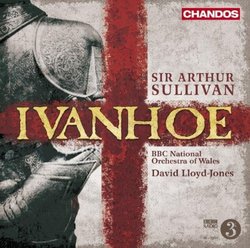| All Artists: BBC National Orchestra of Wales, David Lloyd-Jones Title: Ivanhoe Members Wishing: 0 Total Copies: 0 Label: Chandos Original Release Date: 1/1/2010 Re-Release Date: 2/23/2010 Genre: Classical Style: Opera & Classical Vocal Number of Discs: 3 SwapaCD Credits: 3 UPCs: 095115157824, 095115157824 |
Search - BBC National Orchestra of Wales, David Lloyd-Jones :: Ivanhoe
CD DetailsSimilar CDs |
CD ReviewsOn for Saint George! Jim D. | NYC | 03/05/2010 (5 out of 5 stars) "Though it was the lighter music of the Savoy operettas that made him famous (and rich), Sir Arthur Sullivan longed to make his mark as a serious composer. In 1890 he was given the chance to compose a grand opera in English, based on 'Ivanhoe,' Scott's popular novel of chivalry. It ran for 155 consecutive performances, was given five more times afterwards, then basically vanished from the stage; this is the first professional recording of the entire work. The text isn't any great shakes--Julian Sturgis was no W.S. Gilbert--but much of the music is well worth the wait. Freed from the restrictions of the singing actors and small pit band he normally wrote for, Sullivan gives his lyrical side full rein. While he tried to move away from his usual "numbers opera" style, and largely succeeds, the famous character song "Ho, Jolly Jenkin" and a marvelous double-chorus would be at home at the Savoy. The orchestra and chorus are first-rate, as you'd expect from Chandos. Toby Spence (who could surely headline a new G&S cycle ) lends his ringing voice to the hero, and there are two fine sopranos--Janice Watson and Geraldine McGreevy--as the women who love him. The booklet contains detailed notes (history of the original production, Sullivan's use of motifs, etc), and full libretto." A worthwhile curiosity S. Wells | California | 03/06/2010 (4 out of 5 stars) "Although I may not share the general enthusiasm with which this recording has been greeted on the Internet, I did enjoy hearing it and will probably return to it with pleasure. Is it a lost or neglected masterpiece? Not in my opinion. I found the first act to be very dull. The performance really didn't pick up until the quite thrilling chorus "Plantagenesta!" in the final scene of the first act. Acts Two and Three are much more interesting. But on the whole I thought there was an odd lack of melodic sweep throughout the work. True, Sullivan was trying to define a truly "English" style, but what comes across has about as much romance as bangers and mash when compared with the late romantic music coming from across the channel - particularly from Italy and Germany - at the same time. Don't get me wrong, though. There are some wonderful passages of music. The singing contest between King Richard and Friar Tuck in Act Two is delightful and Act Three has a beautiful quartet. On the whole, I thought Rebecca has the best music and the part is very well sung by Geraldine McGreevy. Indeed, the recording boasts an excellent cast in all parts. King Richard gets a much larger part in the opera than in the novel and Neal Davies presents humour, nobility and fine singing in the part. Peter Rose and Toby Spence as Cedric and Ivanhoe also deserve special mention. Catherine Wyn-Rogers came across as both addled and creepy as the crazed Ulrica. The Lady Rowena is sung by Janice Watson whose tone is a bit blowsy for my taste. (I thought the same of her Elisabeth of Valois in the recent Opera in English recording of "Don Carlos.") Enjoy this recording for what it its - a worthwhile curiosity." A Really Good Try, or Three Strikes and You're Out? Terry Carroll | Canada | 07/05/2010 (3 out of 5 stars) "I first became really enamored of the Gilbert and Sullivan operas when I was in the senior years of high school. I had an aunt who was a drama teacher and who put the plays on at her school. From there I branched to the D'Oyly Cart recordings and later to the University of Michigan sets. By the late 70's I was ordering obscure discs directly from Britain of Sullivan works without Gilbert such as "The Golden Legend" and "Emerald Isle". That brings us to "Ivanhoe".
In the middle 70's there was only a terrible amateur recording from "Rare Recorded Editions". It was in mono and taped from some one in the audience at an amateur performance, and then pressed on scratchy LPs. You had to be really interested and make a real effort to hear the actual opera through all the poor sound and earnest but largely incompetent amateur cast. I found my mind would wander, as I tried valiantly to concentrate on what was going on and follow along. I hoped that someday there would be a proper recording. In the early 90's what was called a "semi-professional" recording by the Prince Concert was available. Again, I listened carefully, and was able to follow along with the libretto this time but still, I found my mind would wander, as I tried valiantly to concentrate on what was going on and follow along. This week I received my copy of the new recording on Chandos. The singing and playing both are wonderful. For the first time I can make out just about every word but still I find my mind wanders, as I try valiantly to concentrate on what is going on and follow along. I have come to this conclusion I am afraid. No mater what recording you have, this opera is just plain boring! Sorry, maybe on stage it is better, but I picture people dressed as knights and fair damsels standing in the middle of the stage, singing, and barely moving. Maybe it is just me, but I can' listen to more than about 15 minutes before I find myself not really paying attention, and thinking of something else. If I just listen and try to concentrate with my eyes closed, I am a goner! Before and after "Jolly Jenkins", it is impossible to keep awake. This set looks nice on the shelf beside my other CD sets, and the completest in me is satisfied, but that is about all. " |


